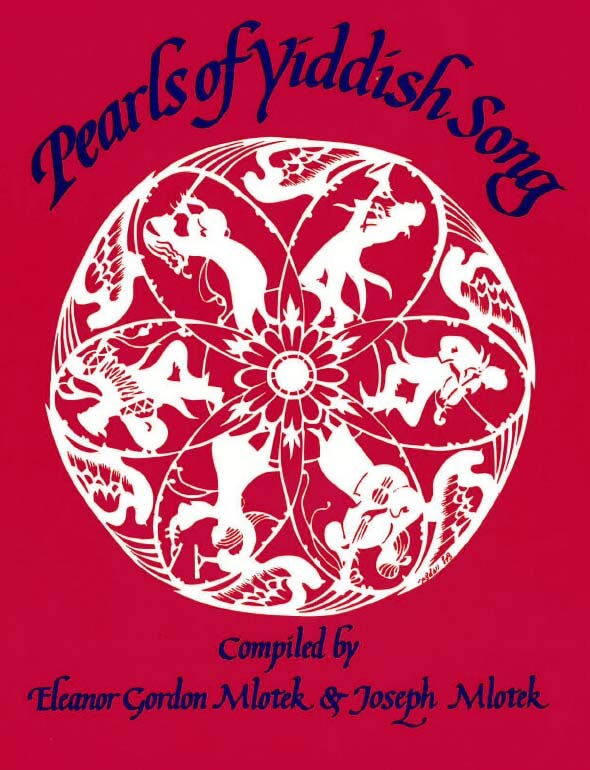Hebrew poem by Khaim Nakhman Blallk (1873-1934), translated into Yiddish by I. Ma Yofis. Words and music published in 1937-1938 by Mikhl Gelbart.

Not caring if it is day or night
I wander, lost in thought;
Neither on the mountain nor in the valley
an ancient willow tree stands.
A prominent one, a great one,
the willow is, and it knows everything.
I will ask the willow tree
about my destined match.
And it will tell me everything,
whether my beloved is from Poland,
from Lithuania or from Zamet,
whether a banker or a schoolteacher.
Whether he is blond or brown haired,
a bachelor or a divorced man.
Or maybe a very old man,
then I will really be unhappy.
I will say, “Father, kill me,
but don’t force this engagement on me.
Oy, I couldn’t bear it,
Father, I don’t want an old man.”
Nit bay tog un nit bay nakht,
Gey ikh arum fartrakht;
Nit oyf barg un nit oyf tol
Shteyt a verbe fun amol.
A gevirete, a groyse,
Iz di verbe, altsding veyst zi.
Bay der verbe vel ikh vegn
Meyn bashertn take fregn.
Un zi vet mir alts dertseyln,
Tsi mayn gelibter kumt fun peyln,*
Tsi fun lite, tsi fun zamet,
A bankir, tsi a melamed.
Tsi a blonder, a bruneter,
A bokher, tsi a gegeter.
Un efsher gor an altn yidn,
Bin ikh take nit tsufridn.
lkh vel zogn: — tate, teyt mikh,
Nor nit tsum shidekh neyt mikh.
Oy, kh’vel dos nit oyshaltn, Kh’vil, tate, nit keyn altn.
**poyln
ניט בײַ טאָג און ניט בײַ נאַכט,
גײ איך אַרום פֿאַרטראַכט;
ניט אױף באַרג און ניט אױף טאָל
שטײט אַ װערבע פֿון אַמאָל.
אַ גבֿירהטע, אַ גרױסע,
איז די װערבע, אַלצדינג װײס זי.
בײַ דער װערבע װעל איך װעגן
מײַן באַשערטן טאַקע פֿרעגן.
און זי װעט מיר אַלץ דערצײלן,
צי מײַן געליבטער קומט פֿון פּױלן,
צו פֿון ליטע, צי פֿון זאַמוט,
אַ באַנקיר, צי אַ מלמד.
צי אַ בלאָנדער, אַ ברונעטער,
אַ בחור, צי אַ געגטער.
און אפֿשר גאָר אַן אַלטן ייִדן. . .
בין איך טאַקע ניט צופֿרידן.
איך װעל זאָגן: טאַטע, טײט מיך,
נאָר ניט צום שידוך נײט מיך.
אױ, כ’װעל דאָס ניט אױסהאַלטן,
כ’װיל, טאַטע, ניט קײן אַלטן.
Song Title: Di Verbe

First published in 1988 as Pearls of Yiddish Song: Favorite Folk, Art and Theatre Songs, this anthology contains 115 songs. Some material had never been published, while others, included in rare song collections or sheet music, were largely inaccessible. The songs presented reflect Jewish life in Eastern Europe and the United States and depict childhood, love, family celebrations, poverty, work and struggle. There are also songs from the Hasidic and Maskilic movements, songs of Zion and of America, as well as songs from the Yiddish theater.
The title of this anthology derives from the weekly two-page feature column “Pearls of Yiddish Poetry,” which the compilers Yosl and Chana Mlotek initiated in 1970 in the Yiddish newspaper Der Forvertz (the Yiddish Daily Forward). Hundreds of readers from around the world — including authors, composers, singers, actors — became co-participants in this collective folk project and recalled melodies, lines, fragments, stanzas and their variants of songs, poems, and plays which they had heard in their youth. At first, readers sent in only written material. Later, they also taped songs on cassettes, many of whose melodies had, until then, never been recorded. They also identified and supplied missing information regarding lyricists, poets, and composers and described the circumstances surrounding the songs’ origins, their dissemination, diffusion and impact.